|
 Secure Site
Secure Site
|
 |
Archive for the 'Natural Awakening' Category
 Decluttering a bedroom space, Digital Zen Alarm Clock What’s the first space in your home that experts recommend tackling when you declutter? If you said the living room, kitchen or foyer, guess again. It’s the bedroom.
“I always start with the bedroom,” says feng shui consultant Andrea Gerasimo of Menomonie, Wisconsin. “It’s your sanctuary.” Gerasimo cites studies showing that what you’re thinking when you nod off affects how you sleep and your mood when you wake up. So if your last mental image is of chaos and clutter, you’re not setting the right stage for quality sleep.
In your bedroom space, do you trip over piles of clothing, boxes, shoes and assorted tchotchkes? Are stacks of DVDs careening from your bedroom entertainment center? Or, perhaps you’ve placed your home office—with its tangle of computer and phone lines, file folders, sticky notes and miscellaneous office supplies—in your sleep space.
The good news is that you don’t have to remodel to streamline your bedroom.
Rearranging furniture (even better, removing a few items), decluttering and adopting a resolute mindset to keep your bedroom space harmonious and clutter-free are simple steps that can make a big difference.
Transform your bedroom from cluttered chaos to serene retreat with these easy tips.
1.Furniture: Less is More
Having too many dressers, tables and chairs jammed into a space—no matter how large—makes it feel smaller. And stuff attracts more stuff. As we add more pieces, we tend to fill them, inside and out.
Solutions:
■ Invite a friend with a fresh set of eyes over for a streamlining session. Move everything out, then open your mind to new arrangements. Bring in the pieces you love most until the room seems adequately furnished but not overly stuffed; the remaining furniture is probably unnecessary. Choose a Zen Alarm Clock for the space next to you bed on your table. Pick the Digital Zen Alarm Clock that has a lid that can be closed to further declutter your bedroom space.
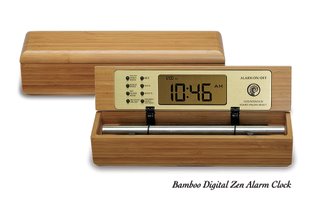 Bamboo Digital Chime Clock, closing the lid to the clock helps declutter your bedroom space ■ Think about what you can donate, use elsewhere or sell. Candidates for the chopping block may include exercise equipment, a dresser, even your television. Family manager coach Beth Dargis of Holland, Michigan, singles out dressers as occupying too much space in a room. (What’s more, their long, low surfaces invite clutter, she says.) Whenever possible, Dargis recommends replacing a dresser with a highboy, which holds roughly the same number of items but with a smaller footprint.
■ While everything is out of the room, consider spiffing up your walls with a fresh coat of no- or low-VOC paint (VOCs are volatile organic compounds that outgas into the air). If you want to change your window treatments to hemp or organic cotton, this is an ideal time. At the very least, give your bedroom a good, thorough cleaning before moving furniture back in.
2.Clothing: The Hidden Culprit
Anytime you declutter a bedroom, you invariably run into a surfeit of clothing, shoes and accessories. This accumulation is the root cause of a number of ills. “People cram in another piece of furniture instead of going through their wardrobes and getting rid of what no longer fits,” says New York interior designer John Loecke, author of the Organizing Idea Book (Taunton, 2006). Many times, Loecke has seen couples introduce substantial armoires to their bedroom space to accommodate one person’s wardrobe because the other’s has overtaken the closet.
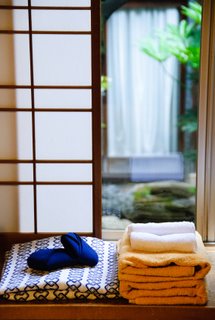 zen-like bedroom Solutions:
■ First, simply pare down. Set aside half a day (with a decluttering buddy, if you can find one) and go through your wardrobe ruthlessly, donating what no longer fits, what you haven’t worn in a year or two, and what’s outdated. Take everything out of the closet and put it in piles to donate or consign, trying on only the items you aren’t sure about. (In the process, I guarantee you’ll discover at least one “treasure” that you’ll want to reclaim!)
■ Once you’ve whittled down your wardrobe, adopt a practice I’ve been following for years. Put two containers in your closet: one for donation, one for consignment. As soon as I wear an item and decide it’s no longer for me, I place it directly into one of the boxes. As soon as one fills, I pop it in my car and drop it off at my charity or resale shop.
■ Once you’ve reduced your holdings, you’ll be surprised at the amount of space you’ve freed up. Before you begin to reload, take this moment to sort everything by category—separate all shirts, dresses, pantsuits and tops into categories. Organize shirts and blouses according to color, from light to dark, or by use, such as dress shirts and T-shirts. This system helps you see what you have. (If you still have more than your closet will bear, and if you have a climate-controlled attic or basement space, you can rotate out-of-season items.)
■ To further streamline, remove as much as possible from the closet floor. A hanging shoe rack helps get shoes up and in sight. The same goes for ties, belts, scarves and hats. As you organize your wardrobe, it’ll be easier—and obvious—to see what you have and which items to chuck.
3. Streamline Bedding
Sometimes the bed itself—including all the attendant bedding and pillows—can create visual clutter.
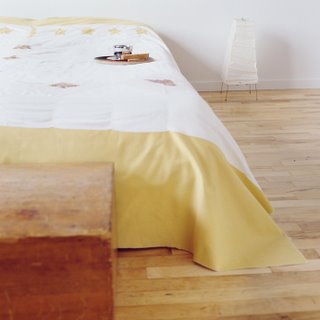 how to declutter your bedroom space
Solutions:
■ Bed size—like just about everything else in America these days—has become supersized. But do you really need a king-size bed? When you’re shopping for your next bed, consider scaling back and opting for a smaller model—if not a full, then try a queen.
■ Also consider streamlining your bedding, says Lisa Quinn, San Francisco-based
interior designer and author of $500 Room Makeovers (Clarkson Potter, 2006). Instead of feathering your nest with brightly colored, matched bedding sets, why not go for basic whites or plain pieces in a limited color palette? If you spill red wine on your butterflies-in-flight pillowcases—or if your zebra-print bottom sheet fades more quickly than the flat—you’ll probably have to discard the entire set to achieve harmony. Plain pieces are interchangeable; you can simply make up any loss with a generic replacement. You also can pick up spare linens at thrift shops and consignment stores. “If your bedding is all white,” Quinn says, “it can take so much off your plate!”
■ Instead of piling on the pillows, pare down to only those you actually use. It makes for a Zen-like bed, and you don’t have to juggle all the extra “show” pillows when you get into bed at night.
4. No Place for Your (Home) Office
Your bedroom should be a pleasure palace or at least a haven for sleep and retreat—not a place where you pay bills, haggle and hassle.
Solutions:
■ If you’ve placed your home office in your bedroom space, try to issue an eviction notice. Any place in the house—including the kitchen, dining room or guest room—is better than your bedroom. A friend in Los Angeles converted a garden shed into a home office, giving her physical separation from her house and a discreet space to do her work as a freelance writer. Another enterprising Los Angeles friend (also a writer) bartered five hours a month of her writing and public relations services in exchange for free space in a lawyers’ office. They even threw in use of their copier.
■ If you see no other solution than putting your office in the bedroom, choose a place where you can shut the doors, such as a closet or computer armoire. Being able to physically close off your home office will help promote peace of mind and better sleep, which, in turn, will make you more productive when you work.
Daily Rituals
These rituals will improve your bedroom’s serenity quotient.
1. Make your bed every day—preferably when you get up in the morning and before you do anything else.
2. Open your draperies or blinds to let the sun shine in.
3. When you come home at the end of the day, hang your clothes or place them in the laundry basket. Avoid the temptation to drape them on a chair.
4. To avoid bedside clutter, keep just one of everything out: the book you’re reading; one bottle of lotion; one pair of slippers.
5. Finally, scrutinize every new item that you introduce into your bedroom. You can avoid the problem of accumulated clutter by making conscious choices in the first place.
 Bamboo Zen Clocks, progressive chime clock and timer adapted from Natural Home Magazine, November/December 2009 by Wanda Urbanska
Now & Zen – The Zen Alarm Clock Store
1638 Pearl Street
Boulder, CO 80302
(800) 779-6383
Posted in Bamboo Chime Clocks, Chime Alarm Clocks, Japanese Inspired Zen Clocks, Natural Awakening, Now & Zen Alarm Clocks, Sleep Habits, Well-being
 how to increase sleepiness Your body needs to sleep in near-total darkness for optimum health. Darkness prompts the pineal gland to produce melatonin, a hormone that increases both sleepiness and length and quality of sleep. Too much light can compromise melatonin production, interfering with slumber. Some studies have suggested that low melatonin levels may be linked to a higher risk of breast cancer, although the more common result of a too-bright room will be a poor night’s sleep. Use an eye mask or install light-blocking shades over your windows to prevent street lamps — even a full moon — from disrupting your sleep. Products to try: Gaiam’s silk sleep mask (gaiam.com). Be sure to wake naturally in the morning with a Chime Alarm Clock by Now & Zen.
Boulder, Colorado—an innovative company has taken one of life’s most unpleasant experiences (being startled awake by your alarm clock early Monday morning), and transformed it into something to actually look forward to. “The Zen Alarm Clock,” uses soothing acoustic chimes that awaken users gently and gradually, making waking up a real pleasure.
What makes this gentle awakening experience so exquisite is the sound of the natural acoustic chime, which has been tuned to produce the same tones as the tuning forks used by musical therapists. According to the product’s inventor, Steve McIntosh, “once you experience this way of being gradually awakened with beautiful acoustic tones, no other alarm clock will ever do.”
adapted from Body + Soul Magazine, February 2006
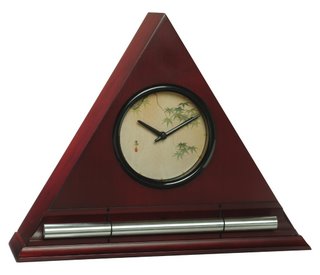 Chime Alarm Clock for a Progressive Awakening Now & Zen – The Zen Alarm Clock Shop
1638 Pearl Street
Boulder, CO 80302
(800) 779-6383
Posted in Natural Awakening, Progressive Awakening, sleep, Sleep Habits, wake up alarm clock, Well-being
 Toyokuni Utagawa, Flower Arrangement By skillfully managing your attention, you’re able to both experience life in a balanced way and stay oriented in a positive, productive direction. John Milton might have been thinking of the power of focus when he wrote: “The mind is its own place, and in itself / Can make a heav’n of hell, a hell of heav’n.”
Like consciousness or mind, attention is a complex neurological and behavioral business. There’s no tidy “attention center” in the brain. Instead, an ensemble of alerting, orienting, and executive networks collaborate to attune you to what’s going on in your inner or outer world in a coherent way that points you toward an appropriate response.
Along with performing the Apollonian task of organizing your world, attention enables you to have the kind of Dionysian experience beautifully described by the old-fashioned term rapt—completely absorbed, engrossed, fascinated, perhaps even “carried away”—that underlies life’s deepest pleasures, from the scholar’s study to the carpenter’s craft to the lover’s obsession. Some individuals slip into it more readily, but research shows that with some reflection, experimentation, and practice, all of us can cultivate this profoundly attentive state and experience it more often.
Considering attention’s importance, it’s surprising that until recently, science has come up with few strategies to improve it. Most new strategies have a “back to the future” quality derived from their origin in meditation, secularized and made amenable to scientific study. These cognitive regimens can strengthen attention and are both free and safe, all of which must appeal to the 78 million baby boomers and their aging children, who are equally concerned about maintaining their mental and physical health.
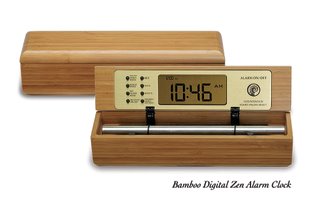 Bamboo Alarm Clocks & Meditation Timers Deciding what to pay attention to for this hour, day, week, or year, much less a lifetime, is a peculiarly human predicament, and your quality of life largely depends on how you handle it. Moses got his focus from God; Picasso from his nearly supernatural creativity. We have other motivations and gifts, and most of us have to go through a more complicated process to find the right things to focus on. We must resist the temptation to drift along, reacting to whatever happens to us next, and deliberately select targets, from activities to relationships, that are worthy of our finite supplies of time and attention.
Perhaps the most important thing I’ve learned is that it shouldn’t take a crisis to show you that your life is the sum total of what you focus on or to make you question that your well-being depends on what happens to happen to you. After running that tough experiment, however, I have a plan for the rest of my life. I’ll choose my targets with care—writing a book or making a stew, visiting a friend or looking out a window—then give them my rapt attention. In short, I’ll live the focused life, because it’s the best kind there is.
Excerpted from Utne Reader, March/April 2010 from the book Rapt: Attention and the Focused Life by Winifred Gallagher
Although meditation can be done in almost any context, practitioners usually employ a quiet, tranquil space, a meditation cushion or bench, and some kind of timing device to time the meditation session. Ideally, the more these accoutrements can be integrated the better. Thus, it is conducive to a satisfying meditation practice to have a timer or clock that is tranquil and beautiful. Using a kitchen timer or beeper watch is less than ideal. And it was with these considerations in mind that we designed our digital Zen Alarm Clock and practice timer. This unique “Zen Clock” features a long-resonating acoustic chime that brings the meditation session to a gradual close, preserving the environment of stillness while also acting as an effective time signal.
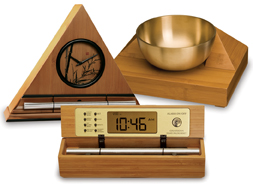 Zen Alarm Clocks with Chimes & Singing Bowls Now & Zen’s Chime Timer and Alarm Clock Store
1638 Pearl Street
Boulder, CO 80302
(800) 779-6383
Posted in Chime Alarm Clocks, Japanese Inspired Zen Clocks, Meditation Timers, Meditation Tools, Natural Awakening, Now & Zen Alarm Clocks
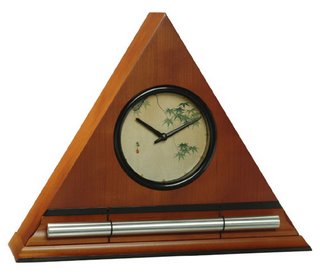 Honey Japanese Maple Leaves Zen Alarm Clock, calming alarm clock useful for remembering one's dreams Steve McIntosh is one of those spiritually driven achievers whom marketers define as part of the “cultural creatives” demographic group. He doesn’t shy away from that label; in fact, he believes that group is on the cultural frontier, making changes in their own lives that will influence our future.
It’s a movement that is going beyond materialism, but still expresses itself with certain material goods. “I want to be part of that culture. I want to express an aesthetic that would capture the mood of the time like the Tiffany lamp expressed the Art Nouveau culture prior to World War I,” McIntosh said.
The former investment banker and lawyer headed the Celestial Seasonings tea company, where, he said, he saw “how a brand can affect American culture.”
In the mid- 1990s, McIntosh was ready to set out on his own. “I wanted to create a line of consumer electronics that would use natural sounds, acoustic sounds that were housed in wood cases rather than plastic,” he said.
In 1996 in Boulder, Colo., he began his company Now & Zen, making the Zen Alarm Clock, (shown below, $119.95) a clock that emits chimes at intervals, and more recently introducing the Tibetan Phone Bell (shown above, $119) on the same principle — that sound should be beautiful and gentle.
His products “exemplify an aesthetic that combines elements of Zen, sacred geometry, classical Greece,” he said.
 zen The clock wakes the sleeper up with an initial chime, followed in 3 1/2 minutes by another, then in smaller intervals until it sounds each four seconds. That interval allows the sleeper to conclude a dream before waking, according to Now & Zen literature.
“Instead of jerking, you get this buffer between sleeping and waking that gives you your consciousness,” he said.
The Tibetan Phone Bell, which features a brass bowl from Asia, “replaces the artificial sound of a phone ringing,” McIntosh said. “Those electric sounds cause stress.”
The sounds of both products are based on an esoteric tradition that dictates what frequencies are most soothing to humans, he said.
Hardcore materialists may laugh, he said, but many people find the Zen Alarm Clock and the Phone Bell pleasant.
“You don’t have to be a Buddhist to appreciate an esthetically beautiful phone,” he said.
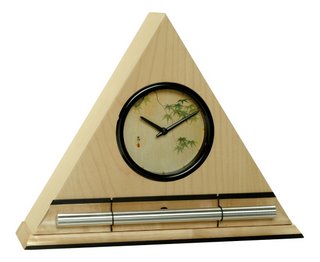 Zen Alarm Clock in Maple Finish, Japanese Leaves Dial Face, harmony in design Now & Zen products are available at the Elephant Pharmacy in Berkeley; Planet Weavers Treasure, Zen Center Book Shop, Walden’s and the Tibet Shop in San Francisco; Body Wise and Siamese Dream in San Rafael; and Milk & Honey in Sebastopol or online at www.now-zen.com.
Excerpted from San Francisco Chronicle, March 2004 by Laura Thomas
 The Zen Clock Showroom Now & Zen – The Zen Alarm Clock Store
1638 Pearl Street
Boulder, CO 80302
(800) 779-6383
Posted in Chime Alarm Clocks, Japanese Inspired Zen Clocks, Meditation Timers, Meditation Tools, mindfulness practice, Natural Awakening, Now & Zen Alarm Clocks, Progressive Awakening, Uncategorized
 Shinsui Itō, Before a Mirror (1916) Ukiyo-e People in need of a creative boost should take a long nap, according to new research highlighted by ScienCentral. The researchers found that naps increase people’s ability to solve problems creatively, but only if the nap includes REM, the deep sleep when dreams occur. REM sleep happens only after about an hour of sleeping, so a long nap is recommended. According to researcher Sara Mednick, “if you take a nap with REM sleep, you’re actually going to be boosting your ability to make these new associations in creative ways.” Mednick has tried to put her findings to good use by taking a nap at least three times each week. A good way to peacefully end your nap is to use your Zen Alarm Clock with progressive chimes.
adapted from Utne.com by Bennett Gordon, September 2009
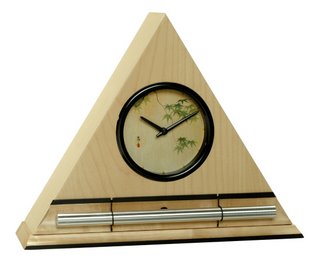 Zen Alarm Clock in Maple Finish with Maple Leaves Dial Face and Chime Now & Zen – The Zen Alarm Clock Store
 Set Your Gentle, Chime Alarm Clock -- The Zen Alarm Clock Shop 1638 Pearl Street
Boulder, CO 80302
(800) 779-6383
Posted in Bamboo Chime Clocks, Chime Alarm Clocks, Japanese Inspired Zen Clocks, mindfulness practice, Natural Awakening, Now & Zen Alarm Clocks, Progressive Awakening, Sleep Habits, Ukiyo-e, Well-being
 Eisen Keisai, Woman Getting out of a Mosquito Net It has happened to all of us: You sit up in bed after a doozy of a dream and wonder What did that mean? Mankind’s fascination with dreams has a long history. In fact, one of the world’s oldest surviving documents, an Egyptian papyrus, contains dream interpretations. Most ancient cultures believed dreams were communications from deities or departed souls. More recently, psychologists Sigmund Freud and Carl Jung paved the way for using dream analysis when treating patients, believing dreams could shed light on the workings of the unconscious mind. Today, many medical and psychiatric professionals believe dreaming can help us move beyond depression and grief and even identify underlying health issues.
As long as you are sleeping, you are dreaming. That’s right, everyone dreams—even if you don’t remember your nightly adventures. “Most dreams occur during REM (rapid eye movement) sleep, which replenishes certain neurotransmitters,” writes Deirdre Barrett, PhD, assistant professor of psychology at Harvard Medical School, in her book The Committee of Sleep (Crown, 2001). Since you enter the light sleep stage characterized by REM every 90 minutes, you’ll likely have four to five dreams a night, assuming you sleep for eight hours. “Interfering with REM, and thus dreaming, interferes with creativity, problem-solving capability, memory, and, in extreme situations, even immune function and body temperature,” says Barrett. You don’t have to remember your dreams to reap some of the benefits, but if you can recall them, your dreams could tell you a lot. “But stay away from dream dictionaries that would have you believe that one symbol means one thing,” Barrett warns. Instead, she recommends Our Dreaming Mind by Robert L. Van de Castle (Ballantine Books, 1995), which focuses on dream theory and learning to work with your dreams. If you really dive deeply into your dream life, the payoff is multifold. You can tap into more clarity and creativity, feel less depressed and stressed, and maybe even be able to predict disease.
Boulder, Colorado—an innovative company has taken one of life’s most unpleasant experiences (being startled awake by your alarm clock early Monday morning), and transformed it into something to actually look forward to. “The Zen Alarm Clock,” uses soothing acoustic chimes that awaken users gently and gradually, making waking up a real pleasure. Rather than an artificial recorded sound played through a speaker, the Zen Clock features an alloy chime bar similar to a wind chime. When the clock’s alarm is triggered, its chime produces a long-resonating, beautiful acoustic tone reminiscent of a temple gong. Then, as the ring tone gradually fades away, the clock remains silent until it automatically strikes again three minutes later. The frequency of the chime strikes gradually increase over ten-minutes, eventually striking every five seconds, so they are guaranteed to wake up even the heaviest sleeper. This gentle, ten-minute “progressive awakening” leaves users feeling less groggy, and even helps with dream recall.
adapted from Natural Solutions Magazine, August 2009
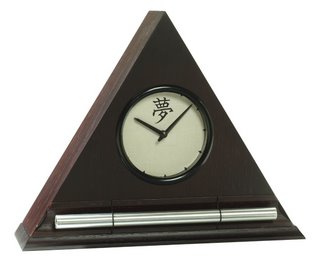 Dream Kanji Zen Alarm Clock with chime in Dark Oak Finish, a wellness tool for remembering dreams Now & Zen’s Chime Alarm Clock Store
1638 Pearl Street
Boulder, CO 80302
(800) 779-6383
Posted in Chime Alarm Clocks, Japanese Inspired Zen Clocks, mindfulness practice, Natural Awakening, Now & Zen Alarm Clocks, Progressive Awakening, Well-being
 Choki Eishosai, Sunrise at New Year It’s hard to learn from your dreams if you can’t remember them. But even if you draw a blank every morning, don’t fret. Follow these steps, recommended by Deirdre Barrett, PhD, assistant professor of psychology at Harvard Medical School, and Andrew Holecek, a dream workshop teacher at Colorado’s Shambhala Mountain Center, to enhance your dream recall.
- Get seven to eight hours of sleep a night. The more you sleep, the more dreams you will have, increasing the likelihood you’ll remember one of them.
- Throughout the day and right before you fall asleep, remind yourself of your intention to remember your dreams.
- Keep a pen and paper by your bed. A dream journal can encourage recall and, at the very least, help you document any fragment you do remember upon waking.
- When you first wake up, don’t move. Lie quietly and reflect on any image that comes to mind. Sometimes a whole dream scenario will come back to you.
- Be mindful during the day, not just about dreams but about everything going on around you. The lucidity you cultivate in waking life will translate to your dream life.
- Set the Zen Alarm Clock to wake you every two hours throughout the night. When the chimming alarm sounds, write down as much as you can remember about the dream you were just having.
Boulder, Colorado—an innovative company has taken one of life’s most unpleasant experiences (being startled awake by your alarm clock early Monday morning), and transformed it into something to actually look forward to. “The Zen Alarm Clock,” uses soothing acoustic chimes that awaken users gently and gradually, making waking up a real pleasure. Rather than an artificial recorded sound played through a speaker, the Zen Clock features an alloy chime bar similar to a wind chime. When the clock’s alarm is triggered, its chime produces a long-resonating, beautiful acoustic tone reminiscent of a temple gong. Then, as the ring tone gradually fades away, the clock remains silent until it automatically strikes again three minutes later. The frequency of the chime strikes gradually increase over ten-minutes, eventually striking every five seconds, so they are guaranteed to wake up even the heaviest sleeper. This gentle, ten-minute “progressive awakening” leaves users feeling less groggy, and even helps with dream recall.
Now & Zen’s Chime Alarm Clock Store
1638 Pearl Street
Boulder, CO 80302
(800) 779-6383
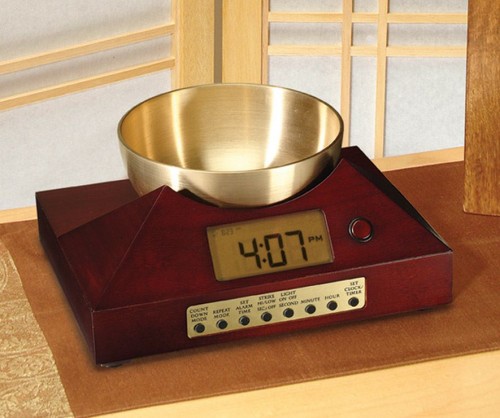 Zen Timepiece, an alarm clock to wake you from napping with Tibetan bowl/gong
Posted in Bamboo Chime Clocks, Chime Alarm Clocks, Japanese Inspired Zen Clocks, mindfulness practice, Natural Awakening, Now & Zen Alarm Clocks, Progressive Awakening, Sleep Habits, Ukiyo-e, Well-being, Zen Clocks and Dream Recall
 koi
“I wish I could show you
When you are lonely
Or in darkness,
The astonishing light
Of your own being.”
-Hafiz
 Honey Japanese Maple Leaves Zen Alarm Clock, calming alarm clock
Now & Zen – The Zen Alarm Clock Shop
1638 Pearl Street
Boulder, CO 80302
Posted in Bamboo Chime Clocks, Chime Alarm Clocks, Japanese Inspired Zen Clocks, Meditation Timers, Meditation Tools, Natural Awakening, Now & Zen Alarm Clocks, Truth
 Pierre-Cécile Puvis de Chavannes: The Dream, 1883
Sleep Type: The Human Alarm Clock
You crash as soon as your head hits the pillow, but wake like clockwork at 2, 3, or 4 a.m.
What’s Going On?
“We all wake up briefly — two to three dozen times a night — without awareness or memory,” says Paul Glovinsky, Ph.D., coauthor of “The Insomnia Answer.” If you’re all too aware of your awakenings, a number of things may be going on. Simple conditioning, a la Pavlov’s dogs, could be to blame. Your body can be “on the lookout for that awakening, especially if there’s a clock in the bedroom,” Glovinksy says. Also consider stress: You may fall asleep out of pure exhaustion, but as soon as your sleep needs are slightly quenched, anxieties wake you up again. For some people, says Rubin Naiman, Ph.D., director of Sleep Programs at Miraval Resort, the body’s inner clock, or circadian rhythms, may be malfunctioning
What to Do
Whatever’s behind your awakenings, hiding your neon time reminder is step one. This would be the perfect time to get the Zen Alarm Clock in the Digital style (so you could close the lid) or the original style without the light. If you can’t see the clock, you won’t panic as you calculate how many hours remain until daybreak — and how little you’ve slept. “Put it on the floor or close the cover to the Zen Clock,” says Joyce Walsleben, R.N., Ph.D., associate professor of medicine at New York University. “When the alarm chimes, you can get up, but otherwise, you’re in bed to sleep.” For many people, this simple shift alone reconditions their brain.
Boulder, Colorado—an innovative company has taken one of life’s most unpleasant experiences (being startled awake by your alarm clock early Monday morning), and transformed it into something to actually look forward to. “The Zen Alarm Clock,” uses soothing acoustic chimes that awaken users gently and gradually, making waking up a real pleasure.
What makes this gentle awakening experience so exquisite is the sound of the natural acoustic chime, which has been tuned to produce the same tones as the tuning forks used by musical therapists. According to the product’s inventor, Steve McIntosh, “once you experience this way of being gradually awakened with beautiful acoustic tones, no other alarm clock will ever do.”
adapted from Body + Soul, May 2008 by Sarah Schmelling
 Alarm Clocks for a Progressive Awakening, Zen Clocks in Digital Styles Now & Zen – The Most Gentle Alarm Clocks with Chimes
Visit Our Shop
1638 Pearl Street
Boulder, CO 80302
Posted in Bamboo Chime Clocks, Goodness, Japanese Inspired Zen Clocks, Meditation Timers, Meditation Tools, mindfulness practice, Natural Awakening, Progressive Awakening, Sleep Habits, Well-being, Zen Clocks and Dream Recall
 Koitsu, Full Moon at Akashi Beach Warm milk, chamomile tea, curling up with The Poetry of Zen—all useful strategies in the battle to beat insomnia. You might want to add auricular, or ear, acupuncture to the arsenal. A review of six trials in The Journal of Alternative and Complementary Medicine found that stimulating certain acupuncture points around the ear could put your insomnia to sleep. Six points were deemed the most effective: shenmen, heart, occiput, subcortex, brain, and kidney.
Hong Kong Baptist University researchers noted acupuncture’s rate of success was high both when compared to a placebo and to sleep medications and anti-anxiety drugs. How auricular acupuncture works is still being explored, but initial studies indicate it increases melatonin, the sleepy-time hormone.
Our Zen Alarm Clock’s long-resonating Tibetan bell-like chime makes waking up a beautiful experience – its progressive chimes begin your day with grace. When the clock’s alarm is triggered, the acoustic chime bar is struck just once … 3-1/2 minutes later it strikes again … chime strikes become more frequent over 10 minutes … eventually striking every 5 seconds until shut off. As they become more frequent, the gentle chimes will always wake you up – your body really doesn’t need to be awakened harshly, with a Zen Clock you’re awakened more gradually and thus more naturally. Unlike artificial recorded sounds coming out of a tiny speaker in a plastic box, natural acoustic sounds transform your bedroom or office environment.
adapted from Natural Solutions,January 2008 By Matthew Solan
 Dream Kanji Zen Alarm Clock with chime in Dark Oak Finish, a wellness tool for insomnia
Now & Zen’s Chime Alarm Clock Store
1638 Pearl Street
Boulder, CO 80302
(800) 779-6383
Posted in Chime Alarm Clocks, Japanese Inspired Zen Clocks, Natural Awakening, Now & Zen Alarm Clocks, Progressive Awakening, Sleep Habits, Ukiyo-e
« Previous Page — « Previous Entries
Next Entries » — Next Page »
|
|
|
|